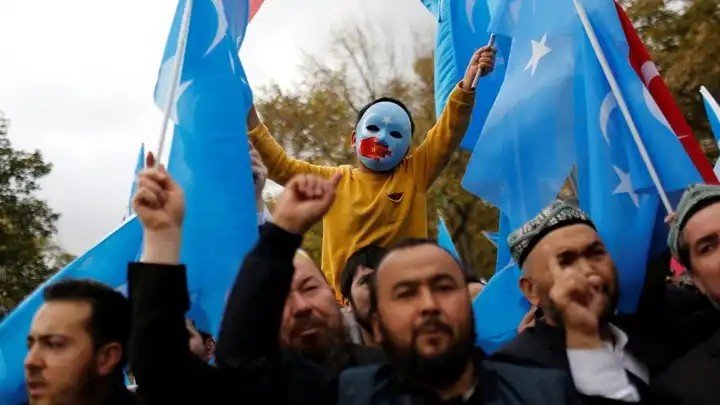
Despite the loss of his re-election, US President Donald Trump is not putting any brakes on his administration’s many confrontations with Communist China. Much to the chagrin of Beijing, the Trump administration earlier in November lifted US ban on a Uighur militant group — the East Turkestan Islamic Movement (ETIM). ETIM has been designated as a terrorist organisation by the UN’s 1267 counter-terrorism committee in 2002 for its alleged association with al-Qaida, Osama bin Laden and the Taliban. Beijing criticized the US move by invoking UNSC, saying that “ETIM is a UN Security Council listed terrorist organisation” and “fighting ETIM is an international consensus and an important part of the international counter-terrorism fight”.
As the US pulls its troops out of Afghanistan, China fears it will open up a “power and military-security vacuum” which could benefit the Uighur militants. China may become the new target for Islamic extremism to take revenge for Beijing’s repressive policies towards ethnic Muslim minorities in Xinjiang province. CCP leadership has regularly blamed ETIM for conducting terror acts in China to achieve its stated goal of establishing an independent state called East Turkestan out of Xinjiang. The shadowy group has also become a fantastic excuse for China to justify a harsh crackdown in Xinjiang.
Although China urged the US to withdraw its troops from Afghanistan in an “orderly and responsible manner” to prevent a security vacuum, yet recent Chinese manoeuvres in Afghanistan suggest that Beijing has been working on a strategy to deal with issues likely to crop up in the face of American retreat. Lately, Beijing has ramped up its outreach to Taliban who control major portions of the war-torn country today. Yun Sun, director of the China program at the Stimson Centre at Washington D.C argues that a caliphate in Afghanistan could always pose a “direct challenge to China’s control of its Muslim population”, yet Beijing has observed signs of moderation in the Taliban’s political ideology. With the help of its ‘Iron Brother’ Pakistan, Beijing hopes that the Taliban will continue to stay away from the Uyghur issue; and that other Islamic terror organizations in the region refrain from inciting Jihad in Xinjiang province.
As for the surprise move by the outgoing Trump administration, lifting of a ban on a little known Uyghur Militant group may actually be an act of American outreach to Uyghur nationalists and militants alike. If past US tactics are anything to go by, there is a strong likelihood that the United States may even start supporting Uyghur militants in the future. The US supplied ammunition to the Mujahideen during the Soviet invasion of Afghanistan, supported and backed the Taliban for a while and even allegedly armed ISIS allies in the Syrian Civil War. While President-elect Joe Biden would like to have everyone believe in American exceptionalism and its role as a Moral Leader of the world; yet Washington itself, ironically hasn’t shied away from using ‘dirty tricks’ to protect its interests, be it toppling allies through coups or hobnobbing with and funding Jihadists.
If the United States’ clandestine services decide to open up a front in the Badakhshan-Xinjiang area to foment trouble in China, New Delhi should be weary of a ‘spill over effect’ in India as happened in the past. After the complete integration of erstwhile Jammu and Kashmir, India’s only Muslim majority-state with the rest of the Union; the domestic jihadists as well as global jihadist are trying hard to ignite an Islamic extremist movement in Kashmir, aided and abetted by foreign powers with either moral or material support.
The India-US relationship has gained a lot lately from the multiple convergences of interests. Washington sees New Delhi as a ‘Major Strategic Partner’ and an important ally to ‘contain’ China’s rise. Nonetheless, New Delhi must remain vigilant of Washington’s tactics vis-a-vis China. The Trump administration has already thrown India under the bus by cutting a deal with the Taliban without securing Indian interests in Afghanistan. Regardless of whether America wants to arm Uyghur militants/jihadists, de-listing of ETIM from its terrorist list sends a negative signal at a time when jihadist attacks are once again gaining traction, particularly in Europe. Every concession to terrorist organisations will only embolden them further. Both India and the United States are victims of terrorism and New Delhi must remind Washington that you can’t keep snakes in your backyard and expect them to bite only your enemies. Surely the Americans have not forgotten 9/11! India must communicate to the United States about possible repercussions of fraternizing with Jihadists in the South Asian region. For America to contain China, it needs an India at ease with its domestic security and stability.
Yet, India must not rely on American goodwill alone. New Delhi should actively work with both the Afghan government in Kabul and the Taliban to prevent radicalization spilling over into Kashmir. Already India has shown willingness to engage with all Afghan parties including the Taliban in the hope of ensuring no anti-India activity finds space on Afghan soil. From maintaining a low profile in Afghanistan by sticking to developmental works and aiding the Afghan government with military training, India finally shifted gears when it participated in the intra-Afghan inaugural dialogue in Doha this year. In the process, New Delhi has opened a direct communication with the Taliban to entrench itself further in Afghanistan in order to offset Pakistan and China’s influence and to seek Kabul’s cooperation in controlling the ‘spill over effect’ into Jammu and Kashmir.






Add comment